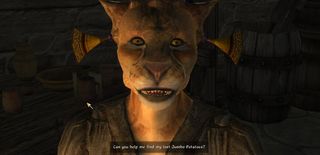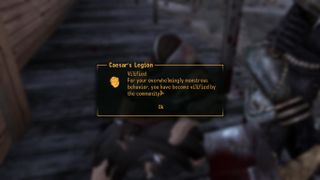How to be a better roleplayer
Experts discuss why we roleplay, and how to have more fun doing it.

Doing it live
All of the NPCs in D&D and other pen-and-paper RPGs are controlled by one person called the Dungeon Master (or something slightly less kinky-sounding like the Game Moderator). Itps part of their job to change the difficulty of the imaginary adventure everyone is having on the fly, and if judged well that can encourage you to make choices that, while in-character, might be mechanically sub-optimal. "If as the DM you give players room to make mistakes that don't kill their characters or bring the adventure to a screeching halt, that makes people feel more comfortable taking crazy risks or getting themselves into trouble," as Mike explains.
There may also be mechanical rewards for taking the kind of risks that make sense for your character, such as bonus experience points. The current edition of D&D gives player-characters flaws and goals and secrets, and a bonus called Inspiration can be earnt by portraying them. "For a new player, I try to help them create a basic, clear motivation to help them get into their character’s shoes," says Mike. "We tried setting up backgrounds in D&D to serve that purpose. Each one has a few roleplaying pointers that hopefully give a new player a clear idea that there’s a difference between themselves and their character. It's a role they're playing, not just a fantasy version of themselves."

"During character creation, I encourage a player to think of what motivates their character, and then, as DM, I work things into the narrative that call to that motivation," Jeremy says. "My goal is for the player to feel as if the story is ready for their character to come to life. During play, I refer to a player by their character's name. Just hearing yourself referred to as someone like Felix, wizard of the Library of the Silver Staff, or Emilia, knight of the Holy Empire of Valentia, helps you get in the mood to roleplay."
There are plenty of ways to get more comfortable with the act of thinking and talking while pretending you’re a wizard.
Something that intimidates a lot of new players is the idea they’ll be expected to perform, to talk in-character for a whole session that could last hours. But that's not really the case. Most games focus on roleplaying the interesting parts, the conversations that are the funniest or most dramatic, while handwaving the rest either by using the game's rules—which may include skill tests for certain kinds of social interaction like haggling or gossip—or simply slipping into narration. 'I ask if anyone saw what happened to the guy who just got robbed,' is a perfectly acceptable way to phrase a question in most games.
“It really depends on the group," Mike explains. "My D&D campaign has a lot of comedic moments, many of them unintentional. The roleplaying is a little more self-aware. I usually find that the most immersive moments happen between players, when people get into their characters and argue a point or course of action."

There are plenty of ways to get more comfortable with the act of thinking and talking while pretending you’re a wizard. "Personally, I find adopting mannerisms and distinct speech patterns really helps," says Mike. "Watch movies with distinct characters in an ensemble cast, like Aliens or Ocean's 11. Those help show you the kind of elements you can add to a character to stand out while communicating your PC's nature. It also helps to tend toward extremes. Those kind of traits stand out more and are easier to communicate. Try playing a very young or old character, or one who is now desperately poor but was once fabulously wealthy. Edge cases are easier to portray."
Characters in uncomfortable situations are the meat and drink of drama.
“I suppose the advice I would give is the basic improv advice: that you have to stay dynamic, and react,” says Grant. “There’s lots of articles about how to roleplay online, how to talk to people, how to interact in that way, find a group who share your interests and hang out together.” He should know, as he’s written one of the best ones, 11 Ways To Be A Better Roleplayer. One of the pieces of advice most relevant to videogames is to find ways of saying yes rather than saying no out of hand.
Comic deals, prizes and latest news
Sign up to get the best content of the week, and great gaming deals, as picked by the editors.
If you've ever played a game that expects you to take on a mission that doesn't immediately make sense for the character you’re playing, try to see if there’s a way you can make it make sense. Or as he puts it: "Why is your Rogue doing this mission for the church? Does he have ulterior motives? Is it out of a sense of companionship with the rest of the party? Characters in uncomfortable situations are the meat and drink of drama."
Grant calls it "the capacity to improvise and adapt and come up with, 'How would my character feel in this situation?' rather than 'My character wouldn’t do this! Fuck this, I’m off!'" To some roleplayers this idea’s anathema. Rationalizing and accepting things that initially seem like they will break your character concept suggests a kind of intellectual fraud, a distance between the player and character that's artificial. Grant disagrees. "Once you can start rationalizing things you get into a really interesting space because you stop finding reasons why you can’t and start finding reasons why you did, and that’s just a better story."

One question remains. If that study from North Carolina University is correct and everyone roleplays whether they realize it or not, why do we do it?
Grant has a theory. "I think whatever you roleplay you’re working something out. Every act of roleplaying is therapeutic or cathartic in some way. That’s something you’re interested in exploring—exploring a different gender or a different sexuality or even a different species in some roleplaying games."
Making decisions we wouldn’t normally make gives us a way to understand what it’s like to be somebody else, essentially. "A bit like you play horror games to be scared, you can roleplay to put on a different identity and to pretend to be something else and that gives you a chance to explore that in a safe space. That is tremendously valuable."
That said, while roleplaying can let us experiment with different identities and learn something from that, it can also be a way to let off steam and escape from our own complicated heads. "The last Fallout character I had was the Duke of Fistington," Grant explains, "who only had punching and talking. He could talk his way into any situation and punch his way out of any other. I really enjoyed that. I quite like one-note horrendous violence characters."

Jody's first computer was a Commodore 64, so he remembers having to use a code wheel to play Pool of Radiance. A former music journalist who interviewed everyone from Giorgio Moroder to Trent Reznor, Jody also co-hosted Australia's first radio show about videogames, Zed Games. He's written for Rock Paper Shotgun, The Big Issue, GamesRadar, Zam, Glixel, Five Out of Ten Magazine, and Playboy.com, whose cheques with the bunny logo made for fun conversations at the bank. Jody's first article for PC Gamer was about the audio of Alien Isolation, published in 2015, and since then he's written about why Silent Hill belongs on PC, why Recettear: An Item Shop's Tale is the best fantasy shopkeeper tycoon game, and how weird Lost Ark can get. Jody edited PC Gamer Indie from 2017 to 2018, and he eventually lived up to his promise to play every Warhammer videogame.
Most Popular

